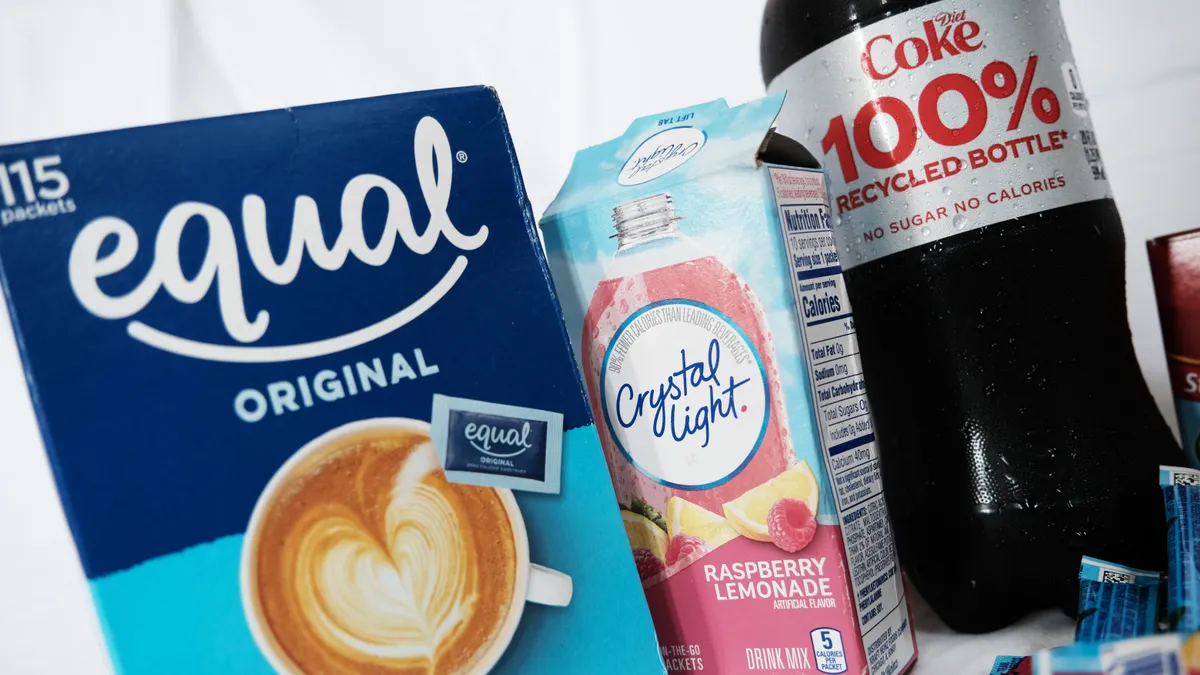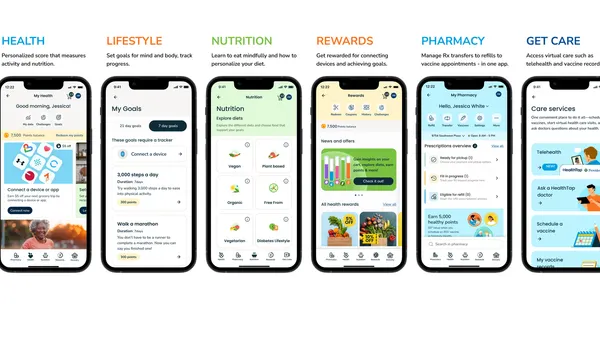Last week, two conflicting reports on aspartame from groups under the World Health Organization rocked the artificial sweetener space and sent shock waves through the grocery and food industries.
The International Agency for Research on Cancer (IARC) classified aspartame as possibly carcinogenic to humans, citing “limited evidence” for carcinogenicity in humans, while the Joint Expert Committee on Food Additives (JECFA) reaffirmed that 40 mg per kilogram of body weight is an acceptable daily intake for the artificial sweetener.
“The World Health Organization’s food safety agency took a comprehensive approach in reviewing available clinical research and reaffirmed that aspartame is safe to consume at established Acceptable Daily Intake levels, in alignment with FDA’s longstanding position on the safety of aspartame,” FMI – The Food Industry Association (FMI) said in a statement.
The trade group noted in its statement that aspartame is “‘one of the most studied food additives in the human food supply,’ per the U.S. Food and Drug Administration, and safe for the general population,” adding that causal links, particularly in observational studies, between food additives and health are difficult to establish.
Consumer confusion is likely to result over whether it’s safe to digest the popular sugar alternative, which is used in about 6,000 products globally including Diet Coke, Extra gum and sugar-free Jell-O, sister site Food Dive noted.
Grocers can play a vital role in helping shoppers navigate any bewilderment they might have about aspartame’s impact on their health and well-being while incentivizing them to focus on how food ties into their overall wellness, Krystal Register, MS, RDN, LDN, senior director of health and well-being at FMI, said in an interview.
“Food is personal,” Register said. “So when someone sees something in the headline that affects themselves and their families, for sure, there will be confusion.”
Registered dietitians’ role in consumer choices
In addition to confusion among consumers about aspartame’s safety, Register, who was a longtime retail dietitian at Wegmans before joining FMI in 2020, said shoppers have also been paying more attention recently to the health factors of all sugars, including added sugars and non-nutritive sweeteners such as aspartame, sucralose and saccharin.
“I do think consumers are becoming more aware of literally what's in my food,” Register said. “So looking at it from that perspective, we have seen consumers looking to reduce added sugars whether that means replacing them with a non-nutritive sweetener or looking for sources of natural sugar over an added sugar.”
Consumers can also have heightened awareness of added sugars in certain food and beverages while not thinking about the added sugars in their coffee shop order, Register said.
Sugar is just one part of that bigger picture of how consumers blend food with health and wellness, noting that similar questions can be asked of sodium, saturated fats and other ingredients. Grocers have an opportunity, Register said, to use the aspartame news to help consumers think about how sugar fits into individualized health choices: “What do I have in a day, in a week? In a month? Where am I getting my added sugars? Where am I getting exposed to non-nutritive sweeteners?”

Registered dietitians are a “fantastic opportunity” for grocers to help people become more aware and mindful about their consumption choices while also helping them to enjoy items, like aspartame, in moderation, Register said.
“We know from the research we do with consumers that the grocery store is valued as a trusted source and consumers see the grocery store as supporting their health goals,” Register said. “And we know that registered dietitians are also very favorable in terms of trust and loyalty.”
Grocers’ registered dietitians can use blog and website content, email campaigns to health-minded consumers, in-app messaging, social media posts and media interviews to help educate consumers about not just aspartame but about health and wellness holistically, Register said.
This push for consumer education ties into one of FMI’s pledges for the White House Conference on Hunger, Nutrition and Health last September is to have its members commit to reaching 100 million consumers with evidence-based nutrition messaging in 2023.
“Summertime is a great opportunity to talk about health and wellness all around: Are you wearing your sunscreen? Are you including fruits and vegetables for the antioxidants that we know help protect us against all of these potential carcinogens we’re exposed to? And, of course, taking it back to actually enjoying food,” Register said.
Registered dietitians can also help consumers understand the differences between types of sugar and no added sugar options, what their consumption habits look like and where they want to cut back or make changes in their sugar intakes.
“Are you looking for no added sugars? Are you looking for no artificial sweeteners? Or maybe you're looking for an option that tastes a little bit sweet but doesn't have the added sugar? There's just that wide breadth of choice,” Register said.
She noted other questions can include: Where are you including sugar currently? Where do you want to cut back? Where do you want to make a swap? And what do you not want to cut back?
Product formulation shifts
It’s unclear how the aspartame reports will impact brands’ usage of the sweetener. PepsiCo, which uses aspartame as a sweetener, said it doesn’t plan to change its product portfolio in the wake of the WHO’s warning on the sweetener, Reuters reported. Other beverages are also likely to also keep using aspartame, The New York Times reported.
However, health and wellness trends, including “food as medicine,” have increasingly gained steam in recent years. “Low sugar” and “no added sugar” are top nutrition attributes that consumers look for, per research by the trade group, and the industry has been responding to that, including private label suppliers, Register said.
Register has been seeing more products that fit those attributes, including items like pasta sauces and salad dressings that consumers usually don’t realize often contain sugar.
“We do see good innovation going on with products to slowly remove or reduce that added sugar,” Register said, noting that the beverage aisle, in particular, is seeing more low-calorie or zero-calorie options.
But consumers may not be aware of the product formulation shifts that are happening because the industry is mindful of consumer perceptions that “no added sugar” might mean it tastes worse than its sweetened counterpart, Register said.
Grocers can spotlight foods with natural sweeteners or no sweeteners as alternatives or “try-something-new” swaps, she added.
“Consumers really are attracted to those beverage options that perhaps don't have any sweetener like a seltzer. ... What I found in the supermarket setting is quite often the gentle nudge is a lot more productive than something more dramatic,” Register said.
Ultimately, FMI wants grocers to stay focused on empowering consumers to make healthy choices: “We acknowledge our members across the food industry who continue to encourage balance, moderation and variety in overall healthy patterns of eating and remain steadfast in reaching consumers with evidence-based nutrition messaging,” per the trade group’s statement.












